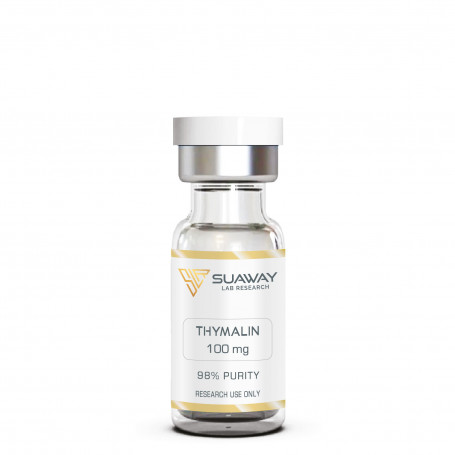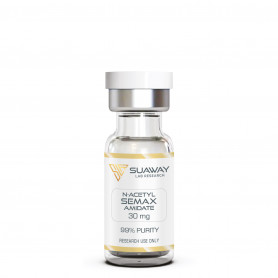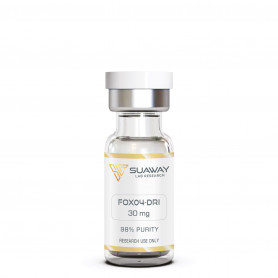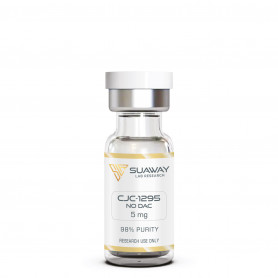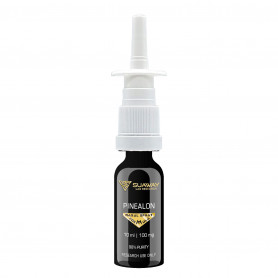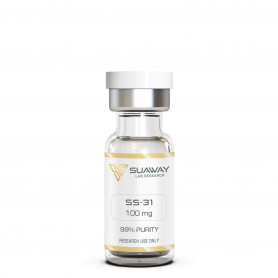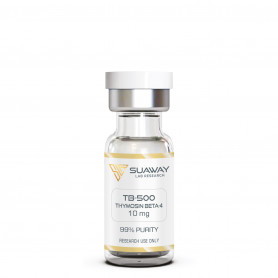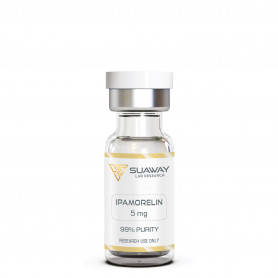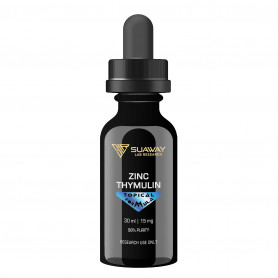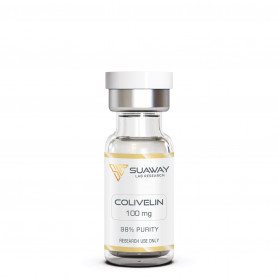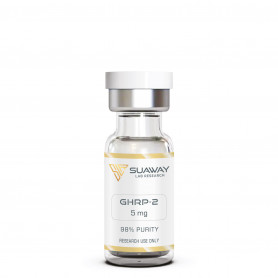THYMALIN - 100mg
Thymalin is a synthetic version of Thymulin, which is involved in regulating inflammation and pain. Research shows that Thymalin may be effective in boosting immune function, fighting heart disease, and regulating sleep-wake cycles. It is also of interest in aging research for its ability to reduce all-cause mortality in mouse models and prolong lifespan.
Beschreibung
STRUCTURE
Sequence: Pyr-Ala-Lys-Ser-Gln-Gly-Gly-Ser-Asn
Molecular Formula: C33H54N12O15
Molecular Weight: 858.864 g/mol
CAS number: 63958-90-7
Peptide purity: greater than 98.0%
Other details: No TFA Salt, No Mannitol
Storage: Lyophilized peptide must be stored at -20°C and peptide solution at 4°C.
Thymalin has low oral and excellent subcutaneous bioavailability.
DESCRIPTION
Studies have shown that this immunomodulator molecule does occur naturally in the thymus. Thymus is a specialized bilobed secondary lymphoid organ which is critical to the development of functionally active and self-tolerant T-cells which is also a component of the adaptive immune system.Studies have shown that the actions of the thymus are mediated by immunomodulators.
The mature T-cells mediates the functions of the adaptive immune system. Loss (or sometimes complete absence) of the thymus before these population thresholds are reached results in DiGeorge Syndrome which is characterized by severe immunodeficiency. There is still residual T-cell lymphopoiesis throughout the adult life.
Nonetheless, studies have shown that complete involution of the thymus in old age is associated with increased susceptibility to severe infections and cancer development. This has been attributed to immune deficiency which impairs the immune response to infections and impairment of immune surveillance against tumors.
Other diseases associated with thymic dysfunction are allergic hypersensitivity, Severe Combined Immunodeficiency Syndrome (SCID), lymphomas, Myasthenia Gravis, thymomas and the rarity APECAD (Autoimmune PolyEndocrinopathy-Candidiasis-Ectodermal Dystrophy). Thymic immunomodulators have the potential of restoring the integrity of thymic activity in a dysfunctional or diseased thymus, thus treating the associated immune deficiency or managing its severity.
This version we carry is a tyhmic factor also known as thymulin, this peptide is endogenous to the human body. Pepetide sequence is Pyr-L-Ala-L-Lys-L-Ser-L-Gln-Gly-Gly-L-Ser-L-Asn-OH.
Researchers of the St. Petersburg Institute of Bioregulation and Gerontology of the North-Western Branch of the Russian Academy of Medical Sciences and the Institute of Gerontology of the Ukrainian Academy of Medical Sciences (Kiev) clinically assessed the geroprotective effects of thymic (Thymalin) and pineal Epithalamin (Epitalon) peptide bioregulators in 266 elderly and older persons during 6-8 years both peptides were given at 10 mg daily for ten consecutive days once every 6 months. The bioregulators were applied for the first 2-3 years of observation.
The obtained results convincingly showed the ability of the bioregulators to normalize the basic functions of the human organism, i.e. to improve the indices of cardiovascular, endocrine, immune and nervous systems, homeostasis and metabolism. Homeostasis restoration was accompanied by a 2.0-2.4-fold decrease in acute respiratory disease incidence, reduced incidence of the clinical manifestations of ischemic heart disease, hypertension disease, deforming osteoarthrosis and osteoporosis as compared to the control. Such a significant improvement in the health state of the peptide-treated patients correlated with decreased mortality rate during observation: 2.0-2.1-fold in the Thymalin-treated group; 1.6-1.8-fold in the Epithalamin-treated group; 2.5-fold in the patients treated with Thymalin plus Epithalamin (Epitalon) as compared to the control.
A separate group of patients was treated with Thymalin in combination with Epithalamin annually for 6 years and their mortality rate decreased 4.1 times as compared to the control.
REFERENCES
V.KH. Khavinson et al., "Thymalin: Activation of Differentiation of Human Hematopoietic Stem Cells" [PubMed]
V.Kh. Khavinson et al., "Geroprotective effect of thymalin and epithalamin" [PubMed]
T.F. Babenko et al., "Thymalin in the combined treatment of patients with chronic lympholeukemia" [PubMed]
G.S. Sukhodoeva et al., "The effect of thymalin on the development of sensitization with a soluble microbial antigen and on the phenotypic composition of lymphocyte subpopulations in the organs of immunity" [PubMed]
K.I. Gurevich et al., "Use of thymalin in trauma patients" [PubMed]
L.S. Kogosova et al., "Effectiveness of administration of thymalin in the complex treatment of pulmonary tuberculosis" [PubMed]
V.Kh. Khavinson et al., "Thymalin: Activation of Differentiation of Human Hematopoietic Stem Cells" [PubMed]
M.L. Chukhlovina et al., "The immunomodulating and metabolic actions of thymalin in an experimental herpetic infection" [PubMed]
B.I. Kuznik et al. "Thymalin as a modulator of immunogenesis and hemostasis" [PubMed]
M.M. Solo'ev et al., "Clinical use of thymalin in the prophylaxis and treatment of infectious-inflammatory diseases of the maxillofacial region" [PubMed]
C.V. Zhukova et al., "Effect of Thymalin on the Tumor and Thymus under Conditions of Activation Therapy In Vivo" [PubMed]
K.G. Mskalik "Effect of thymalin and epithalamin on the metastasis of experimental tumors irradiated with pulsed laser radiation" [PubMed]
V.Kh. Khavinson et al., "The Use of Thymalin for Immunocorrection and Molecular Aspects of Biological Activity" [PMC]
M.P. Isaeva et al., "The effect of thymalin on indices of immunity and hemostasis in patients with disseminated forms of psoriasis" [PubMed]
V.E. Ryzhenkov et al., "Effect of thymalin on the development of experimental hyperlipidemia and atherosclerosis" [PubMed]
V.Kh. Khavinson et al., "The effect of thymalin on biochemical and immunological indices of lymphocyte differentiation and functional activity" [PubMed]
M.U. Musaev "Comparative study of the effects of thymalin and vitamin E on certain indices for local pulmonary protection in rheumatoid arthritis" [PubMed]
N.V. Govorin et al., "Use of thymic peptide thymalin in the complex treatment of therapy-resistant schizophrenia" [PubMed]
N.A. Trekova "Effect of thymalin on protein synthePubMedsis in the brain and conditioned-reflex activity of the progeny of neurosensitized female rats" [PubMed]
B.I. Kuznik et al., "Effect of thymalin on blood coagulation and fibrinolysis" [PubMed]
V.A. Koslov et al., "Efficacy of thymalin in the treatment of patients with traumatic osteomyelitis of the lower jaw" [PubMed]
T.G. Kurbanov et al., "The efficacy of using thymalin in diabetes mellitus in children" [PubMed]
B. Nasseri et al., "Thymulin treatment attenuates inflammatory pain by modulating spinal cellular and molecular signaling pathways" [PubMed]
V.G. Morozov et al., "Natural and synthetic thymic peptides as therapeutics for immune dysfunction" [PubMed]
S.M. Lunin et al., "Thymulin, a thymic peptide, prevents the overproduction of pro-inflammatory cytokines and heat shock protein Hsp70 in inflammation-bearing mice" [PubMed]
B. Kuznik et al., "Peptide Drug Thymalin Regulates Immune Status in Severe COVID-19 Older Patients" [PMC]
V.Kh. Khavinson et al., "Peptides of pineal gland and thymus prolong human life" [PubMed]
DISCLAIMER
This product is intendend for lab research and development use only. These studies are performed outside of the body. This product is not medicines or drugs and has not been approved by the FDA or EMA to prevent, treat or cure any medical condition, ailment or disease. Bodily introduction of any kind into humans or animals is strictly forbidden by law. This product should only be handled by licensed, qualified professionals.
All product information provided on this website is for informational and educational purposes only.

